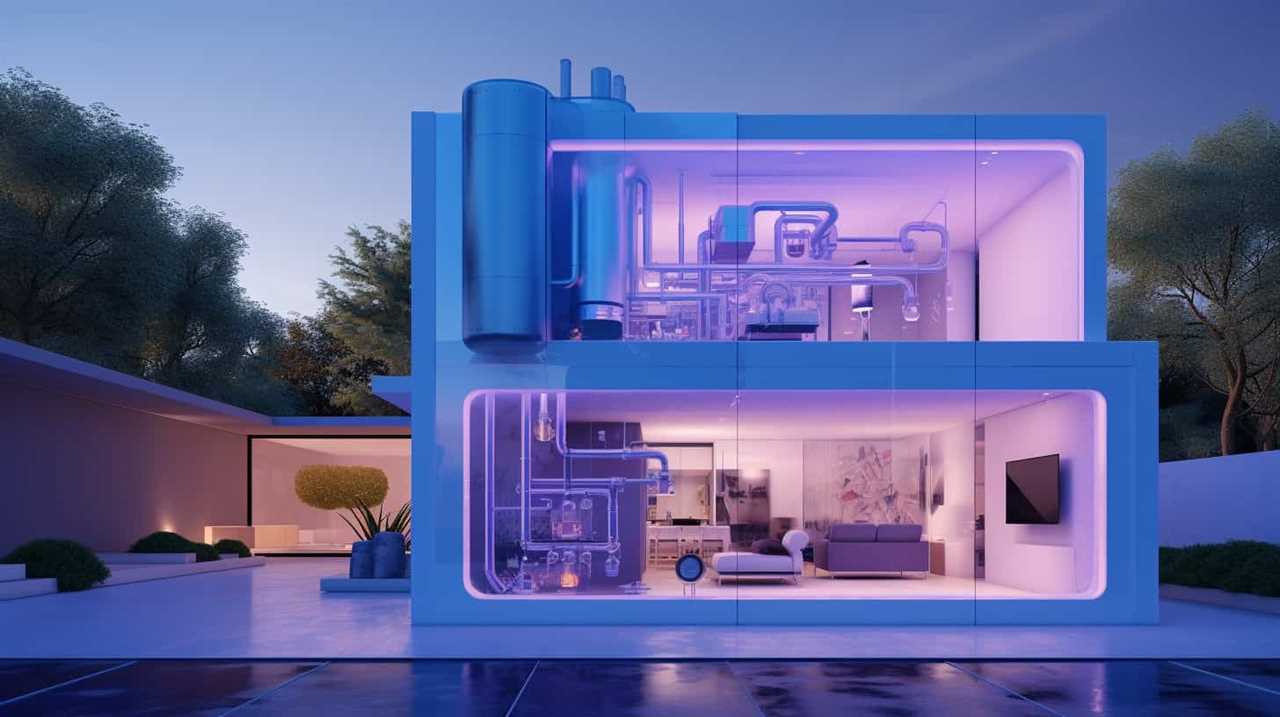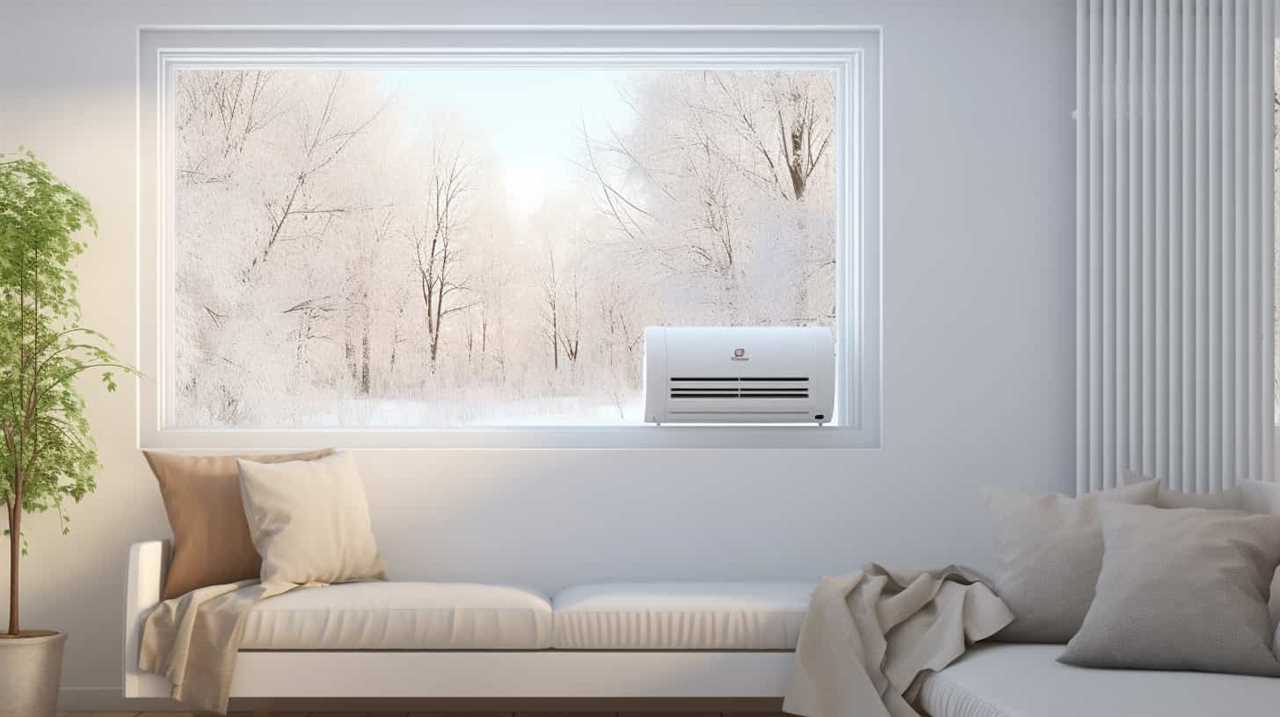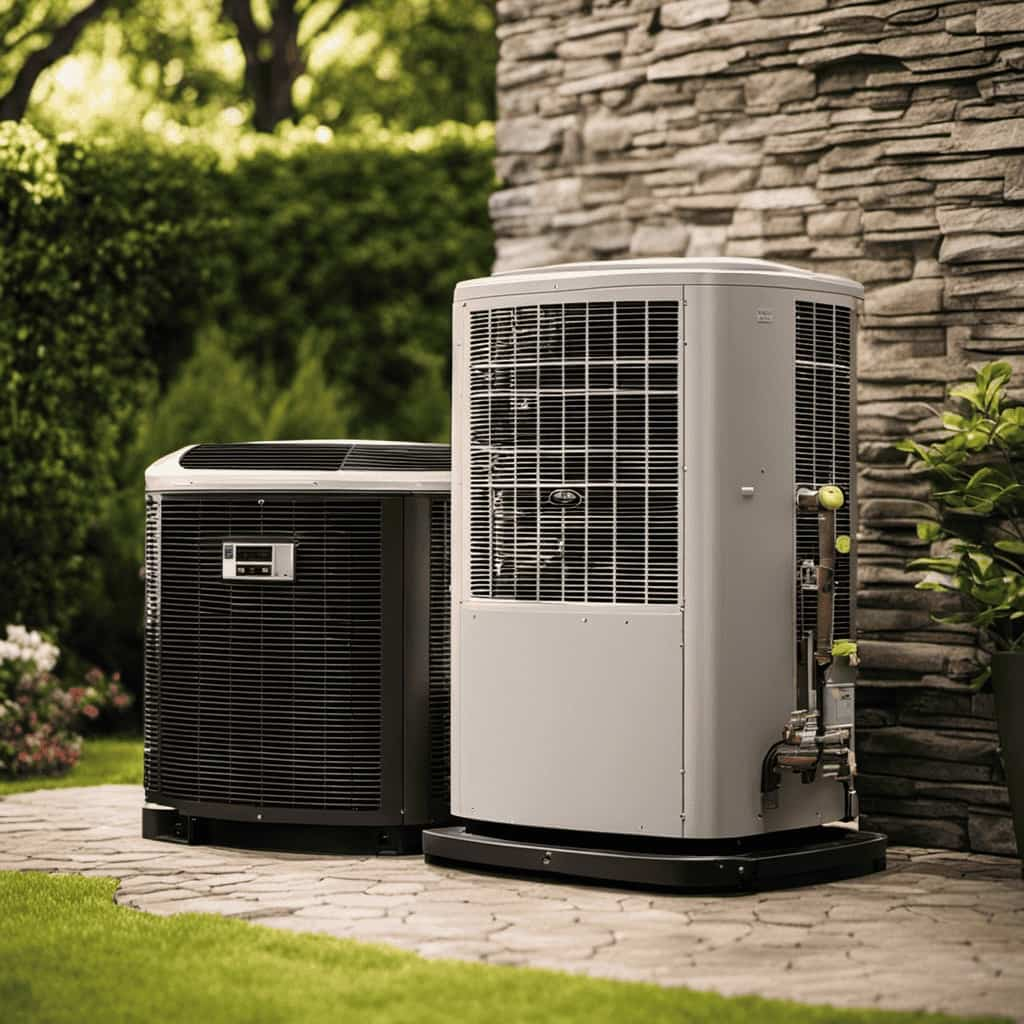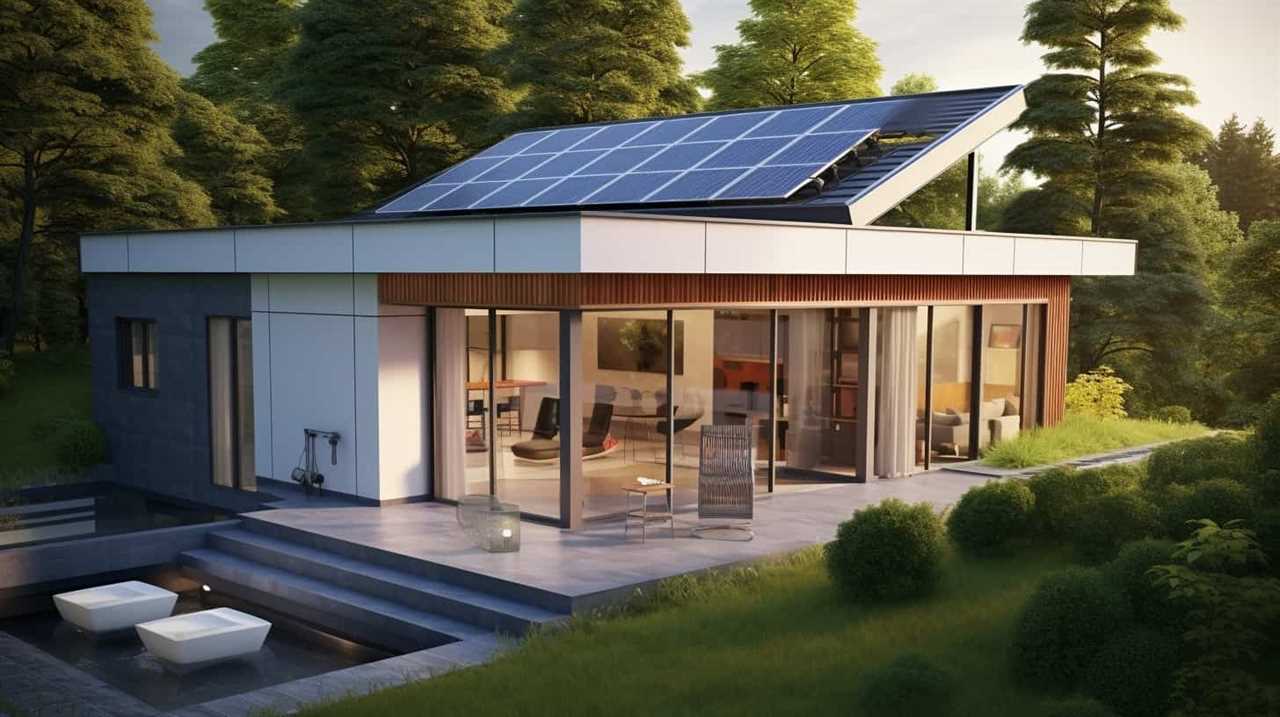Are you looking to understand the distinctions between heat pumps and conventional air conditioning systems? Get ready!
In this article, we’ll be your trusty guides as we delve into the nitty-gritty details of these cooling technologies. We’ll explore everything from energy efficiency and cost considerations to climate compatibility and environmental impact.
Think of us as your GPS for navigating the complex world of HVAC systems. Let’s get started!
Key Takeaways
- Heat pumps are more efficient and environmentally friendly compared to traditional air conditioning systems.
- Heat pumps have a higher upfront cost but provide greater energy savings in the long run.
- Weather conditions, including extreme temperatures and humidity, can impact the performance of both heat pumps and traditional AC systems.
- Heat pumps have lower energy consumption and carbon emissions, making them a greener option.
The Basics: Understanding Heat Pump and Traditional Air Conditioning Systems
Let’s start with the two main types: heat pumps and traditional air conditioning systems.

Understanding the system components and operation principles of these systems is crucial for serving others in the field of HVAC.
Heat pumps are versatile devices that can both heat and cool spaces by transferring heat energy between the inside and outside environments. They consist of four main components: an outdoor unit, an indoor unit, refrigerant lines, and a thermostat.
Traditional air conditioning systems, on the other hand, only provide cooling and consist of three main components: a compressor, a condenser, and an evaporator.
The operation principles of both systems involve the compression and expansion of refrigerant, which allows for the transfer of heat.

Efficiency Matters: Comparing Energy Usage of Heat Pumps and Traditional AC Units
We can compare the energy usage of heat pumps and traditional AC units to determine their efficiency. When it comes to energy savings, heat pumps have a clear advantage over traditional AC units. Here’s why:
- Heat pumps are more efficient:
- Heat pumps use electricity to transfer heat from one place to another, rather than generating it.
- This makes them significantly more efficient, resulting in lower energy consumption and reduced utility bills.
- Environmental sustainability:
- By utilizing heat from the outside air or ground, heat pumps reduce reliance on fossil fuels and decrease greenhouse gas emissions.
- This makes them a more environmentally friendly choice compared to traditional AC units.
- Dual functionality:
- Heat pumps can both cool and heat a space, eliminating the need for separate cooling and heating systems.
- This further enhances energy efficiency and reduces overall energy consumption.
- Smart technology integration:
- Many heat pumps come equipped with smart features, such as programmable thermostats and remote controls.
- These features allow users to optimize energy usage and maximize energy savings.
Considering the energy savings and environmental sustainability benefits, it’s clear that heat pumps are a more efficient choice compared to traditional AC units. Now, let’s move on to evaluating the financial impact of heat pump vs traditional AC units.
Cost Considerations: Evaluating the Financial ImpACt of Heat Pump Vs Traditional AC
When evaluating the financial impact of heat pump versus traditional AC, it is important to consider the upfront and long-term costs associated with each system. While heat pumps may have a higher initial cost, they can provide significant savings over time, making them a more cost-effective option in the long run. To illustrate this, let’s compare the evaluating savings and payback period of both systems:
| Cost Consideration | Heat Pump | Traditional AC |
|---|---|---|
| Upfront Cost | Higher | Lower |
| Energy Efficiency | Higher | Lower |
| Operating Cost | Lower | Higher |
| Payback Period | Longer | Shorter |
As shown in the table, heat pumps have a higher upfront cost but offer greater energy efficiency and lower operating costs. This means that although the payback period may be longer, the long-term savings can outweigh the initial investment. Transitioning into the next section, it is also important to consider climate compatibility and how each system performs in different weather conditions.

Climate Compatibility: Which System Performs Better in Different Weather Conditions
When considering the climate compatibility of heat pumps versus traditional air conditioning systems, it’s important to analyze the impact of weather conditions on their performance and efficiency.
Different climates can have varying effects on the operation of these systems, which can ultimately influence their effectiveness in providing optimal cooling or heating.
Weather Impact on Performance
One significant factor to consider is the number of extreme weather conditions that can impact the performance of both systems. When evaluating the weather impact on performance, it’s important to consider the following:
-
Temperature variations: Both heat pumps and traditional air conditioning systems are designed to operate within specific temperature ranges. Extreme cold or hot weather can affect their efficiency and performance.

-
Humidity levels: High humidity can make it harder for air conditioning systems to cool the air effectively. Heat pumps, on the other hand, may struggle to extract heat from the air in extremely humid conditions.
-
Extreme weather events: Severe storms, hurricanes, or blizzards can cause power outages, which can affect the operation of both systems. Additionally, heavy rain or snowfall can impact the outdoor components of the systems.
-
Climate compatibility: Different regions experience varying weather conditions throughout the year. It’s essential to choose a system that’s well-suited to the specific climate of your area to ensure optimal performance.
Understanding how weather conditions can impact the performance of heat pumps and traditional air conditioning systems is crucial for making an informed decision.

Now, let’s delve into the next section to explore the efficiency of these systems in varying climates.
Efficiency in Varying Climates
We will now examine how both systems perform in different weather conditions to determine which one is more efficient.
When it comes to energy efficiency in extreme temperatures, heat pumps have an advantage over traditional air conditioning systems. Heat pumps can provide both heating and cooling, making them more versatile in varying climates.
In colder climates, heat pumps extract heat from the outside air and transfer it indoors, using less energy compared to traditional heating systems. However, in extremely cold temperatures, the efficiency of heat pumps may decrease, as the difference between the desired indoor temperature and the outdoor temperature increases.

On the other hand, traditional air conditioning systems may struggle to maintain energy efficiency in hot and humid climates, as the presence of high humidity can affect the system’s performance.
Environmental Impact: Exploring the Eco-Friendliness of Heat Pumps and Traditional AC
When comparing the environmental impact of heat pumps and traditional air conditioning systems, several key points come into play.
Firstly, heat pumps are known for their superior energy efficiency, as they can transfer heat rather than generate it, resulting in reduced energy consumption. This translates to lower carbon emissions, making heat pumps a more eco-friendly option.
Additionally, the long-term environmental benefits of heat pumps, such as reduced reliance on fossil fuels and potential for renewable energy integration, further contribute to their positive environmental impact.

Energy Efficiency Comparison
In terms of environmental impact, we’ll explore the eco-friendliness of heat pumps and traditional AC by comparing their energy efficiency. Here is an analysis of the energy efficiency comparison between the two systems:
-
Comparing energy savings: Heat pumps are known for their high energy efficiency as they transfer heat rather than generating it. This results in significant energy savings compared to traditional AC systems that rely on electricity to cool the air.
-
Environmental impact analysis: Heat pumps have a lower carbon footprint due to their energy-efficient operation. They use less electricity, reducing greenhouse gas emissions and contributing to a cleaner environment. Traditional AC systems, on the other hand, consume more energy and release more carbon dioxide, contributing to global warming.
-
Long-term cost-effectiveness: Heat pumps may have a higher initial cost but provide long-term cost savings due to their energy efficiency. Traditional AC systems may have lower upfront costs but result in higher energy bills over time.

-
Renewable energy compatibility: Heat pumps can be integrated with renewable energy sources such as solar power, making them even more eco-friendly. Traditional AC systems don’t have the same level of compatibility with renewable energy sources.
Reduced Carbon Emissions
By reducing carbon emissions and exploring the eco-friendliness of heat pumps and traditional AC, we can better understand their environmental impact. One of the key advantages of heat pumps is their reduced energy consumption compared to traditional AC systems. This leads to lower carbon emissions and a smaller ecological footprint. Heat pumps achieve this by using renewable energy sources, such as geothermal or air-source heat, which can be integrated into the system. In contrast, traditional AC systems rely on electricity generated from fossil fuels, resulting in higher carbon emissions. To illustrate the environmental impact of these two technologies, we have provided a table below:
| Heat Pumps | Traditional AC | |
|---|---|---|
| Energy Source | Renewable (geothermal, air-source) | Fossil Fuels (electricity) |
| Carbon Emissions | Lower | Higher |
| Ecological Footprint | Smaller | Larger |
Long-Term Environmental Benefits
For a comprehensive understanding of the long-term environmental benefits and the eco-friendliness of heat pumps and traditional AC, we’ll delve into their respective impacts.
Here are four key points to consider:

-
Long-Term Savings: Heat pumps have been shown to provide significant long-term savings compared to traditional AC systems. This is because heat pumps utilize renewable energy sources such as the heat in the air or ground, resulting in lower energy consumption and reduced utility bills.
-
Reduced Carbon Footprint: Heat pumps generate less carbon emissions compared to traditional AC units. By utilizing renewable energy sources, heat pumps contribute to a greener and more sustainable environment.
-
Energy Efficiency: Heat pumps are highly efficient in converting energy into heat or cool air. They’re designed to maximize energy usage and minimize waste, resulting in lower energy consumption and reduced environmental impact.
-
Environmental Benefits: Heat pumps are known for their eco-friendliness due to their use of renewable energy sources. By reducing reliance on fossil fuels, heat pumps contribute to cleaner air, reduced greenhouse gas emissions, and a healthier environment.

Maintenance and Repairs: Comparing the Long-Term Reliability of Heat Pumps and Traditional AC Systems
Over time, we’ve found that heat pumps generally require less maintenance and experience fewer repairs compared to traditional AC systems. This can result in significant cost savings for homeowners.
Heat pumps have fewer mechanical components, which means there are fewer parts that can break or malfunction. Additionally, heat pumps operate more efficiently and have longer lifespans, reducing the need for frequent repairs.
In terms of maintenance costs, heat pumps typically only require regular filter changes and occasional professional check-ups to ensure optimal performance. On the other hand, traditional AC systems often require more frequent maintenance, such as cleaning coils, lubricating motors, and replacing belts.
Moreover, traditional AC systems tend to experience higher repair frequencies due to the complexity of their design and the higher number of moving parts.

Frequently Asked Questions
Are Heat Pumps Only Suitable for Certain Climates?
Heat pumps are not limited to certain climates. They can be efficient in both hot and cold environments. However, heat pump efficiency and installation requirements may vary depending on the specific climate conditions.
How Often Do Heat Pumps Need to Be Serviced Compared to Traditional AC Units?
Regular heat pump maintenance is essential for optimal performance, just like servicing traditional AC units. By following heat pump maintenance tips and ensuring regular check-ups, we can enjoy the benefits of efficient cooling and heating all year round.
Can Traditional AC Units Be Converted to Heat Pumps?
Yes, traditional AC units can be converted to heat pumps. However, it is important to consider the advantages of heat pumps over traditional AC units in terms of energy efficiency, as well as the cost considerations of conversion.
Do Heat Pumps Require a Backup Heating System in Colder Climates?
In colder climates, heat pumps may require backup heating options to ensure optimal comfort. However, their energy efficiency makes them a great choice for serving others while reducing energy consumption and utility costs.

How Do Heat Pumps and Traditional AC Units Differ in Terms of Noise Levels?
In terms of noise levels, heat pumps and traditional AC units differ significantly. Heat pumps are quieter due to their design and advanced technology, while traditional AC units tend to be louder and can disrupt the peaceful ambiance of a space.
Conclusion
In conclusion, after analyzing the various factors, it’s clear that heat pumps offer numerous advantages over traditional air conditioning systems.
They’re more energy-efficient, resulting in lower energy usage and cost savings.
Additionally, heat pumps are versatile and perform well in different weather conditions.

From an environmental perspective, heat pumps are more eco-friendly, contributing to a greener future.
Finally, when considering maintenance and repairs, heat pumps prove to be reliable and durable.
Overall, heat pumps are the superior choice for efficient and sustainable cooling.









